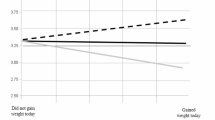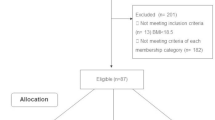Abstract
Background: Six months of loss followed by gradual regain to baseline is descriptive of most weight loss attempts.Purpose: This study sought to identify thoughts and feelings accompanying weight loss that might explain the phenomenon.Methods: Thoughts, feelings, and body weight were measured weekly for 6 months in 41 women receiving behavioral treatment for obesity.Results: Overall, the weight loss experience of these women was positive, requiring modest time and effort and being associated with more positive than negative thoughts and experiences. Over time, however, positive but not negative reactions to the weight loss experience decreased, as did the strength of beliefs that the benefits of weight loss were worth the effort. In addition, we found no relation between the women’s perception of effort and weight loss results.Conclusions: Inadequate long-term rewards for behaviors needed for weight control may be an important cause of frequent weight loss failures.
Similar content being viewed by others
References
Jeffery RW, Drewnowski A, Epstein LH, et al.: Long-term maintenance of weight loss: Current status.Health Psychology. 2000,19(Suppl):5–16
Perri MG, Fuller PR: Success and failure in the treatment of obesity: Where do we go from here?Medicine, Exercise, Nutrition and Health. 1995,4:255–272.
Wing RR: Behavioral approaches to the treatment of obesity. In Bray GA, Bouchard C, James WPT (eds),Handbook of Obesity, New York: Marcel Dekker, 1998, 855–878.
Jeffery RW, Wing RR, Mayer RR: Are smaller weight losses or more achievable weight loss goals better in the long term for obese patients?Journal of Consulting and Clinical Psychology. 1998,66:641–645.
Oster G, Thompson D, Edelsberg J, Bird AP, Colditz GA: Lifetime health and economic benefits of weight loss among obese persons.American Journal of Public Health. 1999,89:1536–1542.
Harris JK, French SA, Jeffery RW, McGovern PG, Wing RR: Dietary and physical activity correlates of long-term weight loss.Obesity Research, 1994,2:307–313.
Rothman AJ: Toward a theory-based analysis of behavioral maintenance.Health Psychology. 2000,19(Suppl):64–69.
Rachlin H:Judgment, Decision, and Choice: A Cognitive/Behavioral Synthesis. New York:Freeman, 1989.
Weinstein ND, Rothman AJ, Sutton SR: Stage theories of health behavior: Conceptual and methodological issues.Health Psychology. 1998,17:290–299.
O’Connell DO, Velicer WF: A decisional balance measure and the stages of change model for weight loss.International Journal of Addictions. 1988,23:729–750.
Yates BT: Cognitive versus diet versus exercise components in obesity bibliotherapy; Effectiveness as a function of psychological benefits versus psychological costs.Southern Psychology. 1987,3:35–40.
Klem ML, Wing RR, McGuire MT, Seagle HM, Hill JO: A descriptive study of individuals successful at long-term maintenance of substantial weight loss.American Journal of Clinical Nutrition. 1997,66:239–246.
Urban N, White E, Anderson GL, Curry S, Kristal AR: Correlates of maintenance of a low-fat diet among women in the Women’s Helth Trial.Preventive Medicine, 1992,21:279–291.
Wadden TA, Stunkard AJ, Smoller JW: Dieting and depression: A methodological study.Journal of Consulting and Clinical Psychology. 1986,54:869–871.
Yates BT: Cognitive versus diet versus exercise components in obesity bibliotherapy: Effectiveness as a function of psychological benefits versus psychological costs.Southern Psychologist. 1987,3:35–40.
Metropolitan Life Insurance Company: Metropolitan height and weight standards.Statistical Bulletin of the New York Metropolitan Life Insurance Company, 1983,64:2–9.
Jeffery RW, Wing RR, Thorson C, et al.: Strengthening behavioral interventions for weight loss: A randomized trial of food provision and monetary incentives.Journal of Consulting and Clinical Psychology. 1993,61:1038–1045.
Rosenberg M:Society and the Adolescent Self Image, Princeton, NJ: Princeton University Press, 1965.
Cash TF:The Multidimensional Body-Self Relations Questionnaire’s User’s Manual. Norfolk, VA: Author, 1994.
Stevens J:Applied Multivariate Statistics for the Social Sciences (3rd Ed.). Mahwah, NJ: Lawrence Erlbaum Associates, Inc., 1996.
Smith CF, Burke LE, Wing RR: Six-month outcome of two behavioral weight loss treatments focusing on primary motivations for weight loss. Annual Meeting of the North American Association for the Study of Obesity, Charleston, SC, 1999.
King CM, Rothman AJ, Jeffery RW: The Challenge Study: Theory-based interventions for smoking and weight loss.Health Education Research. 2002,17:522–530.
Author information
Authors and Affiliations
Corresponding author
Additional information
This research was supported by Grant NS38441 from the National Institute of Neurological Disorders and Stroke and by Grant DK50456 from the National Institute of Diabetes and Digestive and Kidney Diseases. We thank Carolyn Thorson for her help with data collection and weight loss intervention management.
About this article
Cite this article
Jeffery, R.W., Kelly, K.M., Rothman, A.J. et al. The weight loss experience: A descriptive analysis. ann. behav. med. 27, 100–106 (2004). https://doi.org/10.1207/s15324796abm2702_4
Issue Date:
DOI: https://doi.org/10.1207/s15324796abm2702_4




